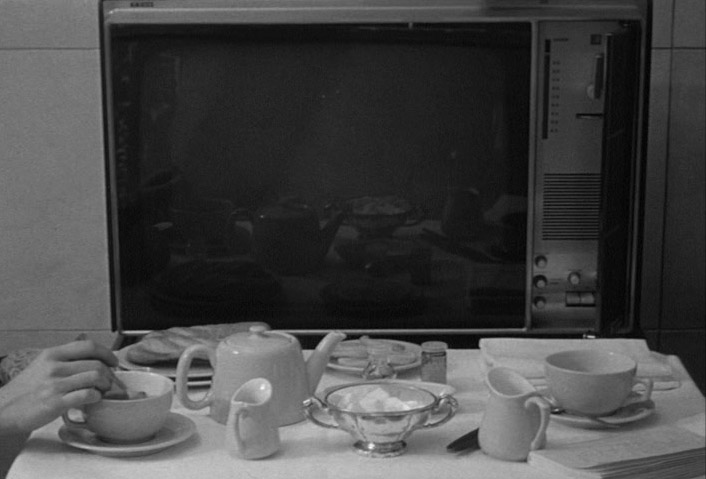RE: Alphaville - I thought that Godard thought
he was doing something clever, mainly deconstructing
the sci-fi/dystopia genre,* with this film, but this
experiment was doomed to fail since standard "good"
sci-fi is already judged by how it deconstructs the
present. Sci-Fi is already inherently a
deconstructivist genre, it pulls apart the unstable
oppositions that underlie modern politics or
psychology or what have you. It's already a critique
of something, and to perform a critique of a critique
on something is getting into this icky, masturbatory
recursive territory that's unpleasant and frankly
boring to watch. And I'm going to shoot myself in the
head if I use "deconstructivist" like that again.
Even worse, Godard seems to want to play it both ways,
borrowing the tropes/plot of Sci-Fi wholesale but then
only amping the ludicrousness of the dialogue ("light
years more powerful" ) and adding in atrocious sound
design in order to highlight the "this is a burlesque"
aspect of the film. Which would be fine, if it was a
romp, but it wasn't. For the first 5 minutes or so
when Lemmy Caution is shooting the random interlopers
in his hotel, I was kind of enjoying it on a "Kill
Bill"* level, but then with the first of a series of
jarring shifts in tone (if we wouldn't accept that
from a lesser director, why should we accept it from
Godard?) we get the sense that Godard is also trying
to make a serious point - but the same
"serious" point that science fiction ALWAYS makes -
that automation and cybernetics and central planning**
(which are the future, if they're not *GASP* already
here!) are BAD, dude, harmful to artists, lovers,
children and other living things. I guess when a
film or a novel is absurd I also want it to be
funny - or at the very least, somehow
enlightening. I'd prefer funny though.
This ludditism drags along its siamese twin (they
share a brain, natch), the "
(straight-white-monogamous**) love-conquers-all" plot.
Now, while it would probably be impossible to resist
the charms of Anna Karina, and indeed I could perhaps
be persuaded by her charms to pit myself against your
average mid-sized totalitarian state, I don't think
for one minute that my temporary infatuation is going
to put a dent in a gurgling, galaxy-spanning
supercomputer and it's countless minions. As the
philosopher says, "They say that nothing last forever,
so what makes, what makes, love the exception?" Gah!
I hate this device, wherever it appears, and
I'm surprised that Godard doesn't try to subvert it,
really. It's tempting to take the love story as
wholly ironic - just a piece lifted out of a "real"
sci-fi movie and dropped in here without a wink, but
as the Andrew Sarris essay (which I didn't read
before I saw the film) you link shows, some
sophisticated people who loved the film take it
straight. (and why does she say "je vous aime"
instead of "je t'aime"? Is that a sophisticated pun
about how her love will HEAL US ALL or am I just being
obtuse?)
We can be thankful least there's no "chosen one" in
this film, really, but beyond that, aside from some
great camera work by Coutard (and, if you please - who
is more responsible for the *look* of these films -
Godard or Coutard or some third brain between them?)
and Anna Karina's outfits there's not much to
recommend about this film. I'm willing to admit, as
always, that I am Wrong, but it would take some pretty
steep convincing to get me to watch the film again. I
think he might not just have a feel for the genre
*(and offering us a pastiche of other related genres -
hardboiled detective fiction, in particular. However,
those two genres seem to be inseperable to me,
already, but maybe that's because my exposure to them
is limited to the most successful works of the late
70s/early 80s (PK Dick, Neuromancer, Bladerunner,
etc.) Perhaps when Godard did it was Fresh.)
|

